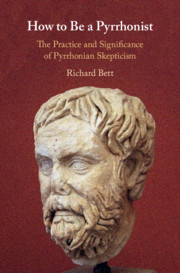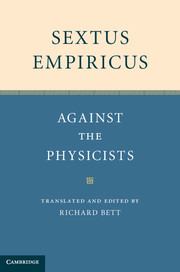How to Be a Pyrrhonist
What was it like to be a practitioner of Pyrrhonist skepticism? This important volume brings together for the first time a selection of Richard Bett's essays on ancient Pyrrhonism, allowing readers a better understanding of the key aspects of this school of thought. The volume examines Pyrrhonism's manner of self-presentation, including its methods of writing, its desire to show how special it is, and its use of humor; it considers Pyrrhonism's argumentative procedures regarding specific topics, such as signs, space, or the Modes; and it explores what it meant in practice to live as a Pyrrhonist, including the kind of ethical outlook which Pyrrhonism might allow and, in general, the character of a skeptical life - and how far these might strike us as feasible or desirable. It also shows how Pyrrhonism often raises questions that matter to us today, both in our everyday lives and in our philosophical reflection.
- Brings together detailed essays on aspects of Pyrrhonism in one place
- Takes a thematic approach to this important ancient school of thought, demonstrating its relevance for philosophy both then and now
- Explores the practical consequences of Pyrrhonism, enabling readers to enhance their understanding of what it meant to live as a Pyrrhonist
Product details
March 2019Hardback
9781108471077
278 pages
235 × 157 × 19 mm
0.52kg
Available
Table of Contents
- Part I. How the Pyrrhonists Present Themselves:
- 1. The Pyrrhonist's dilemma: what to write if you have nothing to say
- 2. Why care whether scepticism is different from other philosophies?
- 3. Humor as philosophical subversion, especially in the sceptics
- Part II. Pyrrhonists at Work: Specific Topics:
- 4. The sign in the Pyrrhonian tradition
- 5. Aenesidemus the anti-physicist
- 6. The modes in Sextus: theory and practice
- Part III. Life as a Pyrrhonist:
- 7. What kind of self can a Greek sceptic have?
- 8. How ethical can an ancient sceptic be?
- 9. Living as a sceptic
- Part IV. Intersections of Pyrrhonism with Contemporary Thought:
- 10. Can an ancient Greek sceptic be Eudaimôn (or happy)? And what difference does the answer make to us? 11. On Pyrrhonism, stances, and believing what you want
- 12. Can we be ancient sceptics?








